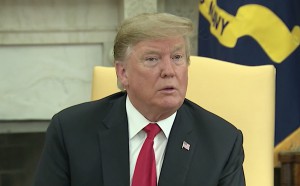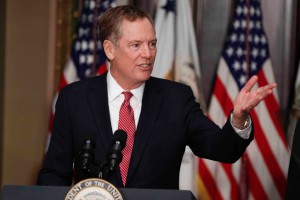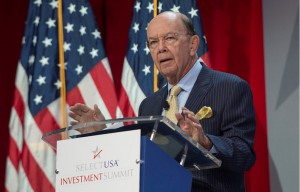
The Trump administration would like lose a case before the WTO if it implements its Section 232-based tariffs.
President Donald Trump’s potential plan to implement new tariffs on inbound goods, such as autos and automotive components, claiming they represent a threat to the national security of the U.S. likely won’t survive a challenge with the World Trade Organization.
Trump order the Commerce Department last fall to determine if the imports could be national threats under Section 232 of the Trade Expansion Act of 1962. Recently, Commerce Secretary Wilbur Ross delivered a recommendation that they could indeed be viewed that way, allowing the administration to slap a 25% tariff on the goods.
For much of its presidency, Trump has chastised automakers – foreign and domestic – for not building enough vehicles and components in the U.S. and he planned to do something about it, if they do not. However, a former adjudicator with the WTO who has recently ruled on a similar issue told Reuters that any country challenging the levy before the WTO would likely win their case.
The clause in the trade act has been considered a kind of “third rail” in international trade until 2016, when Trump became president. It had been avoided because trade experts feared it could become a common way to get around the rules and erect the kind of trade barriers the WTO was designed to remove, Reuters reported.
(Japan says it won’t agree to quotas by the U.S. Click Here for the story.)

U.S. Trade Representative Robert Lighthizer is on a mission to meet with several U.S. trade partners.
However, a tariff like that has been used in the past in disputes between Russia and Ukraine and between Qatar and several of its neighbors, as well as in Trump’s tariffs.
Senior trade arbitrator Georges Abi-Saab, a former chairman of the WTO’s Appellate Body, the world’s top trade court, told Reuters he doubted the national security argument for cars would withstand a legal challenge.
“Frankly I think, if I were a lawyer (working on the case) I wouldn’t accept to take such a case – not only on moral aspects, but I think it would be very difficult to make it prevail,” he told Reuters.
(Click Here to see Toyota’s CEO say he’s “sad” about being considered a security threat.)
Abi-Saab has some recent experience with these types of disputes. Last month, he chaired a dispute panel that settled a dispute in favor of Russia, which was found to have a bona fide legal defense against Ukraine because of an armed conflict recognized by the United Nations.

Commerce Secretary Wilbur Ross led the Section 232 investigation into whether or not imported automobiles and parts represent a threat to the United States.
But the ruling — the first and only of its kind — set a high bar for national security claims, saying they needed to be based “objectively” on an emergency in international relations, and the less a claim had to do with actual war, the harder it would be to make the case.
That contrasts with the U.S. view, according to Reuters, that national security claims are “self-judging” and WTO adjudicators must automatically dismiss any challenge. For now, it’s a non-issue as Trump has sent U.S. Trade Representative Robert Lighthizer on an extended trade mission to test the waters with several countries.
(Tariff talk put on hold for six months by Trump administration. Click Here for the story.)
The European Union has already shot down a proposal by the Trump administration to adhere to a quota system. No firm decisions have been made by the administration yet.
